|
|
|
Sort Order |
|
|
|
Items / Page
|
|
|
|
|
|
|
| Srl | Item |
| 1 |
ID:
158356
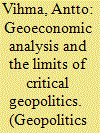

|
|
|
|
|
| Summary/Abstract |
There is a new wave of interest in the interplay between commerce and strategy, and ‘geoeconomics’ is again becoming a key concept in policy analysis. In the academia, however, since the emergence of the concept in the early 1990s, geoeconomic analysis has mostly been viewed through very critical lenses. Analysts have portrayed geoeconomics as simplified neorealism, as a neoliberal discourse, and as a securitisation project. This criticism of geoeconomics relies on an incomplete view of IR realism, as well as some oversimplifications of Luttwak, who introduced the term in 1990. This article underscores the relative property of Luttwak’s argument, in which economic means are gaining in importance in relation to military power, and countries are increasingly, but not always, turning to logic of conflict and geoeconomic policies. Luttwak also underscores the role of domestic politics and ideologies in determining whether a country engages in geoeconomic behaviour or not. The article suggests that strategic geoeconomic theory-building, inspired by but not limited to Luttwak, has much to contribute to our contemporary understanding of IR and geography, for example, in the analysis of strategy and the different power capabilities of states.
|
|
|
|
|
|
|
|
|
|
|
|
|
|
|
|
| 2 |
ID:
158360
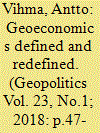

|
|
|
|
|
| Summary/Abstract |
In response to comments on a longer article, this essay notes that several scholars define geoeconomics in remarkably broad terms, covering an array of things: borderless economic zones, strategic economic instruments of foreign policy, both neoliberalism and economic nationalism, and so forth. Something is surely gained, but also lost, in developing the concept of geoeconomics towards this all-encompassing direction. The risk is that the concept becomes overly extensive and loses its analytical power.
|
|
|
|
|
|
|
|
|
|
|
|
|
|
|
|
| 3 |
ID:
142916
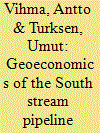

|
|
|
|
|
| Summary/Abstract |
Energy trade has developed into one of the most contentious and divisive issues between Russia and the EU in the post-Cold War era. It reflects a broader geoeconomic struggle in which economic means are used to advocate geopolitical goals. This article argues that the case of the South Stream Pipeline Project (SSPP)--a grand project abruptly cancelled by Russian President Vladimir Putin in December 2014--epitomizes these power politics. In 2014, Russian leadership advanced both geopolitical and geoeconomic strategies towards the ELI: pursuing the former by conducting a military campaign in Crimea and Eastern Ukraine; and pursuing the latter by pushing the construction of SSPP in spite of the EU's legal and political objections. Due to Russian military aggression in Ukraine, however, the EU was able to harden its line on SSPP. Russian geoeconomic activity has long been successful as a centrifugal, dividing power within the EU. The geopolitical campaign in Ukraine, in stark contrast, has been a centripetal force, resulting in increased EU unity that contributed to the SSPP's demise. This is evidence that claims of geoeconomics as a continuation of war by other means are potentially misleading. The means of geopolitical power projection and geoeconomic power projection thus have notably different effects in today's contemporary, interconnected world.
|
|
|
|
|
|
|
|
|
|
|
|
|
|
|
|
| 4 |
ID:
145288
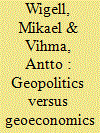

|
|
|
|
|
| Summary/Abstract |
Geopolitics and geoeconomics are often addressed together, with the latter seen as a sub-variant of the former. This article shows the usefulness of differentiating them at a conceptual level. By juxtaposing traditional geopolitics and geoeconomics, we suggest that they have remarkably different qualities and implications for their targets, on both national and international levels. Importantly, these include the formation of alliances, and whether they are driven by balancing, bandwagoning or underbalancing dynamics. An analysis of Russia's shifting geostrategy towards Europe shows these differences in practice. Russian geoeconomics has long been successful as a ‘wedge strategy’, dividing the EU. As a result, the EU has underbalanced and its Russia policies have been incoherent. The observable tendencies in 2014–15 towards a more coherent European approach can be explained by the changing emphasis in Russia's geostrategy. Russia's turn to geopolitics works as a centripetal force, causing a relative increase in EU unity. Centripetal tendencies due to heightened threat perception can be observed in the economic sanctions, emerging German leadership in EU foreign policy, and discussion on energy union. The analysis calls for more attention to the way strategic choices—geopolitics versus geoeconomics—affect the coherence of threatened states and alliance patterns.
|
|
|
|
|
|
|
|
|
|
|
|
|
|
|
|
| 5 |
ID:
107932
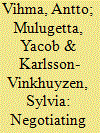

|
|
|
|
|
| Publication |
2011.
|
| Summary/Abstract |
The negotiating group of developing countries, the G77, is one of the most important institutions in global climate governance. This article analyses the cohesiveness of, and internal tension within, the G77 coalition by using the politics of climate change as the empirical window. The study examines four arenas of UN-based deliberations on climate change in the years 2007-2010; the Security Council, the Commission on Sustainable Development, the General Assembly and the United Nations Framework Convention on Climate Change (UNFCCC). We argue that these deliberations, once they reached the top of the international political agenda in 2007, and ever since, have posed deeper challenges to the G77 coalition than ever before. While developing country interests are both converging and diverging, the increasingly conflicting interests, as well as the very slowly eroding common identity, are creating increasingly unified subgroups in the G77. The G77 is highly unlikely to break up formally, but how functional it will be as a bloc in the forthcoming climate change negotiations remains an open question.
|
|
|
|
|
|
|
|
|
|
|
|
|
|
|
|
|
|
|
|
|